
HEALTHY NUTRITION
RESOURCES:
The Stand Up (more) & Eat (better) web site is an educational and participatory site to help people balance the calories they eat with the calories they burn each day.
We are promoting "calorie literacy". You can learn to: * Stand up more (i.e., sit less) * Find simple ways be physically active in different places * Add more moderate and vigorous exercise into your daily life * Make the most of your daily calories by choosing nutrient-rich, low-calorie foods * Eat proper portions * Reduce excess fat and sugar in your diet * Live in settings that foster active living and healthy eating habits * Use proven tools and programs that will help you adopt healthier habits
The Top 10 Antioxidant Foods: Natural Protection
With thanks and acknowledgement to Michelle Stewart, RDLD/N,CDE,
Consulting & Associates, LLC,
Hollywood, FL — www.TheNutritionPlanner.com
We've known for years that antioxidants can help prevent heart disease and cancer, reduce blood pressure and slow the effects of aging. These naturally occurring compounds protect the body from harmful, excess free radicals, sweeping them up before they can cause damage. And the best way to lay an antioxidant-rich foundation that's inhospitable to toxins and free radicals is through a combination of whole foods.
BERRIES
Few fruits have quite the provocative allure, the fragile charm or the nutrients of berries. 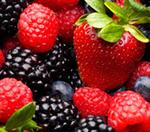 They're full of fiber, minerals and vitamins, and loaded with healing antioxidants. Blueberries, raspberries and blackberries are rich in proanthocyanidins, antioxidants that can help prevent cancer and heart disease. Strawberries, raspberries and blackberries contain ellagic acid, a plant compound that combats carcinogens. Blueberries also appear to delay the onset of age-related loss of cognitive function.
They're full of fiber, minerals and vitamins, and loaded with healing antioxidants. Blueberries, raspberries and blackberries are rich in proanthocyanidins, antioxidants that can help prevent cancer and heart disease. Strawberries, raspberries and blackberries contain ellagic acid, a plant compound that combats carcinogens. Blueberries also appear to delay the onset of age-related loss of cognitive function.
Quick Tips: Stir raspberries into vanilla yogurt, add whole blueberries to salads, or dress up sliced strawberries with a little honey, balsamic vinegar and black pepper.
BROCCOLI
Maybe you never listened when Mom said, "Eat your broccoli." So listen now. 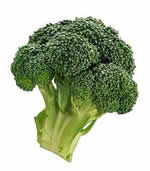 Broccoli and other cruciferous vegetables like cabbage, cauliflower and Brussels sprouts, can help prevent cancer and ward off heart disease. Cruciferous vegetables contain a compound called indole-3-carbinol (I3C - a potent antioxidant that breaks down estrogen in the body) that reduces the risk of breast cancer and other estrogen-sensitive cancers, like cancer of the ovaries and cervix. Other studies have shown that broccoli can help fight cervical dysplasia, a precancerous condition. Broccoli also contains other protective constituents like beta-carotene, which can help prevent cancer and heart disease.
Broccoli and other cruciferous vegetables like cabbage, cauliflower and Brussels sprouts, can help prevent cancer and ward off heart disease. Cruciferous vegetables contain a compound called indole-3-carbinol (I3C - a potent antioxidant that breaks down estrogen in the body) that reduces the risk of breast cancer and other estrogen-sensitive cancers, like cancer of the ovaries and cervix. Other studies have shown that broccoli can help fight cervical dysplasia, a precancerous condition. Broccoli also contains other protective constituents like beta-carotene, which can help prevent cancer and heart disease.
Quick Tips: Wrap cooked, chilled broccoli with roasted pepper strips, or toss steamed broccoli with olive oil, chopped black olives and crushed red pepper flakes.
TOMATOES
Tomatoes are fast becoming one of our favorite modern foods, and for good reason -- they can ward off certain kinds of cancer, prevent macular degeneration and cataracts, and help maintain mental function as we age. 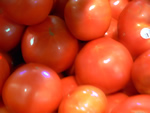 Tomatoes contain lycopene, a relatively rare member of the carotenoid family, also found in pink grapefruit and twice as powerful as beta-carotene. Studies have shown that men who eat more tomatoes or tomato sauce have significantly lower rates of prostate cancer. Other studies suggest lycopene can help prevent lung, colon and breast cancers. Tomatoes also contain the antioxidant glutathione, which helps boost immune function. Note: cooked tomatoes are preferable, since heat allows more desirable antioxidants in tomatoes to be made available to the body. And because lycopene is fat-soluble, eating tomatoes with oil can improve absorption.
Tomatoes contain lycopene, a relatively rare member of the carotenoid family, also found in pink grapefruit and twice as powerful as beta-carotene. Studies have shown that men who eat more tomatoes or tomato sauce have significantly lower rates of prostate cancer. Other studies suggest lycopene can help prevent lung, colon and breast cancers. Tomatoes also contain the antioxidant glutathione, which helps boost immune function. Note: cooked tomatoes are preferable, since heat allows more desirable antioxidants in tomatoes to be made available to the body. And because lycopene is fat-soluble, eating tomatoes with oil can improve absorption.
Quick Tips: Add minced sundried tomatoes to mashed potatoes, or toss Roma tomatoes with chopped fresh basil and olive oil and serve over pasta.
RED GRAPES
A little red wine can keep your heart beating longer and stronger. Why? Mostly because of substances called resveratrol and quercetin found in red grapes. 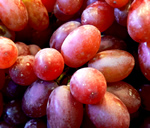 These potent antioxidants boost heart health by acting as free-radical scavengers, reducing platelet aggregation and helping blood vessels remain open and flexible. Resveratrol can also protect against cancer and reduce the risk of inflammatory diseases, gastric ulcers, stroke and even osteoporosis.
These potent antioxidants boost heart health by acting as free-radical scavengers, reducing platelet aggregation and helping blood vessels remain open and flexible. Resveratrol can also protect against cancer and reduce the risk of inflammatory diseases, gastric ulcers, stroke and even osteoporosis.
Quick Tips: Snack on frozen red grapes for a sweet treat, or heat organic red wine with cinnamon sticks and a few whole cloves.
GARLIC
The "stinking rose," perhaps the world's oldest known medicinal and culinary herb, is packed with antioxidants that can help fend off cancer, heart disease and the effects of aging. 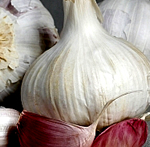 The sulfur compounds that give garlic its pungent odor are thought to be responsible for its healing benefits. Studies have shown that garlic keeps the heart healthy by lowering cholesterol levels, reducing blood pressure, fighting free radicals and keeping blood from clotting. Other studies suggest that eating garlic regularly can help prevent cancer. It also has potent anti-fungal properties and can help treat asthma and yeast infections.
The sulfur compounds that give garlic its pungent odor are thought to be responsible for its healing benefits. Studies have shown that garlic keeps the heart healthy by lowering cholesterol levels, reducing blood pressure, fighting free radicals and keeping blood from clotting. Other studies suggest that eating garlic regularly can help prevent cancer. It also has potent anti-fungal properties and can help treat asthma and yeast infections.
Quick Tips: Roast whole heads of garlic until soft, and spread on warm baguette slices or puree roasted peppers with garlic for a fast sauce.
30 Ways to Sneak More Fruits and Vegetables Into Your Diet
With thanks and acknowledgement to Michelle Stewart, RDLD/N,CDE,
Consulting & Associates, LLC,
Hollywood, FL — www.TheNutritionPlanner.com
Breakfast
- Add blueberries to pancake, waffle, or muffin batter
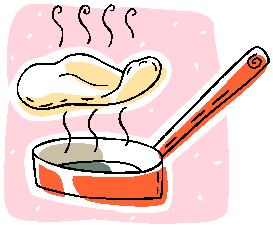
- Mix raisins, diced apple, or dried apricots into oatmeal
- Add pepper, onion, spinach, broccoli, or shredded carrot to a morning omelet
- Make a smoothie with fruit, low-fat yogurt, and ice
- Add peppers and onion to hash browns, and serve with a little ketchup on the side
- Top a toasted waffle with warmed applesauce
Lunch & Dinner
- Top a pizza with mushrooms, peppers, onions, or pineapple
- Put a slice of avocado on a regular sandwich
- Add mushrooms, peppers, onions, or diced carrots to spaghetti sauce
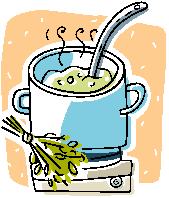
- Place a few slices of tomato on a grilled cheese sandwich
- Add some extra mixed vegetables to soup
- Add celery, onions, carrots, or peppers to meatloaf
- Replace the jam on a peanut butter sandwich with sliced bananas
- Add apples, grapes, or raisins to chicken salad
- Spread some cranberry sauce on a turkey sandwich
- Top pork chops with apples, pears, or raisins
- Roast fish under a layer of lemon, orange, or lime slices
- Add layers of frozen spinach or eggplant to lasagna
Sides & Snacks
- Top a baked potato with salsa
- Use applesauce to replace half of the oil in any recipe
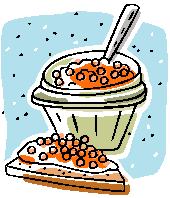
- Slice a sweet potato, toss with a little olive oil, season as you wish, and bake to make sweet potato chips
- Add mandarin oranges or diced pears when making Jell-O® salad
- Try mixing dried fruit with almonds and a few M&Ms® as a snack
- Mix fresh fruit and granola into yogurt
- Add broccoli or diced pepper to macaroni and cheese
- Blend cooked cauliflower into mashed potatoes
Dessert
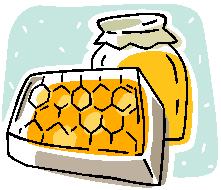 Choose fruit sorbet instead of ice cream
Choose fruit sorbet instead of ice cream- Enjoy a baked apple stuffed with raisins and topped with a drizzle of caramel sauce
- Dip strawberries in chocolate syrup and top with low-fat whipped cream
- Roast pears with honey and a sprinkling of ginger.

